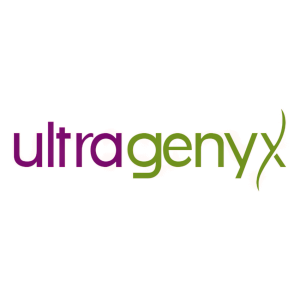Ultragenyx Presents Positive Update on GTX-102 Angelman Syndrome Program at FAST’s 17th Annual Global Science Summit
Rhea-AI Summary
Ultragenyx Pharmaceutical (NASDAQ: RARE) presented positive Phase 1/2 data for GTX-102, its investigational treatment for Angelman syndrome, at the FAST Global Science Summit. The data supports the upcoming Phase 3 Aspire study, showing significant improvements across multiple domains at Week 48. Patients (n=40) demonstrated a mean change of +6.7 in Bayley-4 Cognition GSV score and +10.9 in Raw score. The Phase 3 study is powered at 95% to detect treatment effects. In Expansion Cohorts A&B, 80% of patients (22 of 28) achieved clinically meaningful improvement in at least one domain, with a total net response of +2.0. The Phase 3 trial will enroll 120 patients and is set to begin by year-end.
Positive
- Phase 1/2 trial showed significant cognitive improvements with +6.7 mean change in Bayley-4 Cognition GSV score
- 80% of patients achieved clinically meaningful improvement in at least one domain
- Phase 3 study has >95% power to detect treatment effects
- GTX-102 demonstrated consistent and acceptable safety profile
Negative
- None.
Insights
The Phase 1/2 clinical trial results for GTX-102 in Angelman syndrome demonstrate compelling efficacy signals. The mean change of +6.7 in Bayley-4 Cognition GSV score exceeds the minimally important difference of +5, while the +10.9 point improvement in Raw score suggests robust statistical power for the Phase 3 trial. Particularly noteworthy is that 80% of patients showed meaningful improvement in at least one domain.
The Multi-domain Responder Index showing a +2.0 net response with high statistical significance (p<0.0001) indicates broad therapeutic impact across multiple symptoms. The study's comprehensive evaluation across cognition, communication, behavior, motor function and sleep provides a holistic view of treatment benefits. The consistent safety profile and planned 120-patient Phase 3 trial design appear well-positioned to validate these promising early results.
Phase 1/2 data show improvements across all domains and confirm that Phase 3 Aspire study is amply powered to establish efficacy of GTX-102
Phase 3 program on track to begin enrollment by end-of-year
NOVATO, Calif., Nov. 09, 2024 (GLOBE NEWSWIRE) -- Ultragenyx Pharmaceutical Inc. (NASDAQ: RARE) today announced Phase 1/2 data in support of the Phase 3 Aspire study for GTX-102, its investigational antisense oligonucleotide for Angelman syndrome, that will be presented at the 2024 Foundation for Angelman Syndrome Therapeutics (FAST) Global Science Summit in Orlando, Florida.
“Cognition is the building block for the development and ascertainment of many new skills across a range of the domains we have evaluated in the Phase 1/2 study. The data presented at FAST reinforce that the Aspire Phase 3 primary endpoint of cognition, as measured by Bayley-4, appears very well powered to show statistically significant separation between the GTX-102 and sham arms,” said Eric Crombez, M.D., chief medical officer at Ultragenyx. “We are on track to begin enrolling the Phase 3 Aspire study by the end of this year and have a robust and experienced global network of sites that will enable accelerated study execution.”
The global Phase 3 Aspire study will enroll approximately 120 patients with Angelman syndrome with a genetically confirmed diagnosis of full maternal UBE3A gene deletion and will include a 48-week primary efficacy analysis period. The primary endpoint will be improvement in cognition assessed by Bayley-4 cognitive raw score, and the key secondary endpoint will be the Multi-domain Responder Index (MDRI) across the five domains of cognition, receptive communication, behavior, gross motor function, and sleep.
As of the September Phase 1/2 data cut-off, patients in the Dose Expansion Cohorts demonstrated continued improvement across multiple domains at Week 48 (Day 338). Patients (n=40) in the Dose-escalation and Expansion Cohorts at Week 48 demonstrated a mean change in Bayley-4 Cognition Growth Scale Value (GSV) score from baseline of +6.7 compared to the minimally important difference of +5. Using the Phase 3 primary endpoint of Bayley-4 Cognition Raw score, the mean change from baseline was +10.9. This suggests the Phase 3 study has greater than
Week 48 (Day 338) data from 28 patients in Expansion Cohorts A&B were evaluated with the Phase 3 key secondary endpoint of MDRI and showed a total net response of +2.0 (p-value < 0.0001). The data demonstrate that approximately
These data confirm that the Phase 3 Aspire study is amply powered to establish the efficacy of GTX-102 on the primary endpoint of cognition or the key secondary endpoint of MDRI at the Week 48 timepoint.
GTX-102 demonstrated a consistent and acceptable safety profile as of the data cutoff.
The latest Ultragenyx corporate deck with these data updates can be accessed at https://ir.ultragenyx.com/.
U.S. residents can learn more by visiting www.ultraclinicaltrials.com.
About GTX-102
GTX-102 is an investigational antisense oligonucleotide delivered via intrathecal administration and designed to target and inhibit expression of UBE3A-AS. Nonclinical studies have shown that GTX-102 reduces levels of UBE3A-AS and reactivates expression of the paternal UBE3A allele in neurons of the central nervous system (CNS). Reactivation of paternal UBE3A expression in animal models of Angelman syndrome has been associated with improvements in some of the neurological symptoms associated with the condition. GTX-102 has been granted Orphan Drug Designation, Rare Pediatric Disease Designation, and Fast Track Designation from the FDA and Orphan Designation and PRIME designation from the EMA.
About the Phase 1/2 study
The Phase 1/2, open-label, multiple-dose, dose-escalating study is evaluating the safety and tolerability of GTX-102 administered by intrathecal (IT) injection to pediatric patients with Angelman syndrome with a genetically confirmed diagnosis of full maternal UBE3A gene deletion. The study is also assessing clinical response as measured by a panel of efficacy assessments for the functional domains impacted in Angelman syndrome. The study has enrolled and treated 74 patients in both Dose-escalation and Expansion Cohorts. Patients in Dose-escalation Cohorts 4-7 are receiving long-term maintenance dosing. Data from the Expansion Cohorts will be used to verify the GTX-102 dose and treatment regimen for the pivotal Phase 3 study.
About Angelman syndrome
Angelman syndrome is a rare, neurogenetic disorder caused by loss-of-function of the maternally inherited allele of the UBE3A gene. The maternal-specific inheritance pattern of Angelman syndrome is due to genomic imprinting of UBE3A in neurons of the central nervous system (CNS), a naturally occurring phenomenon in which the maternal UBE3A allele is expressed and the paternal UBE3A is not. Silencing of the paternal UBE3A allele is regulated by the UBE3A antisense transcript (UBE3A-AS), the intended target of GTX-102. In almost all cases of Angelman syndrome, the maternal UBE3A allele is either missing or mutated, resulting in limited to no protein expression. This condition is generally not inherited but instead occurs spontaneously. It is estimated to affect approximately 60,000 people in commercially accessible geographies.
Individuals with Angelman syndrome have a lifelong neurodevelopmental disorder including cognitive impairment, motor impairment, balance issues and debilitating seizures. Some individuals with Angelman syndrome are unable to walk and most do not speak. Anxiety and disturbed sleep can be serious challenges in individuals with Angelman syndrome. Although individuals with Angelman syndrome have a normal lifespan, they require continuous care and are unable to live independently. Angelman syndrome is not a degenerative disorder, but the loss of the UBE3A protein expression in neurons results in abnormal communications between neurons. Angelman syndrome is often misdiagnosed as autism or cerebral palsy. There are no currently approved therapies for Angelman syndrome; however, several symptoms of this disorder can be reversed in adult animal models of Angelman syndrome, suggesting that improvement of symptoms can potentially be achieved at any age.
About Ultragenyx Pharmaceutical Inc.
Ultragenyx is a biopharmaceutical company committed to bringing novel products to patients for the treatment of serious rare and ultrarare genetic diseases. The company has built a diverse portfolio of approved therapies and product candidates aimed at addressing diseases with high unmet medical need and clear biology for treatment, for which there are typically no approved therapies treating the underlying disease.
The company is led by a management team experienced in the development and commercialization of rare disease therapeutics. Ultragenyx’s strategy is predicated upon time- and cost-efficient drug development, with the goal of delivering safe and effective therapies to patients with the utmost urgency.
For more information on Ultragenyx, please visit the company's website at: www.ultragenyx.com.
Ultragenyx Forward-Looking Statements and Use of Digital Media
Except for the historical information contained herein, the matters set forth in this press release, including statements related to Ultragenyx's expectations and projections regarding its future operating results and financial performance, business plans and objectives for GTX-102, expectations regarding the tolerability and safety of GTX-102, and future clinical and regulatory developments for GTX-102 are forward-looking statements within the meaning of the "safe harbor" provisions of the Private Securities Litigation Reform Act of 1995. Such forward-looking statements involve substantial risks and uncertainties that could cause our clinical development programs, collaboration with third parties, future results, performance or achievements to differ significantly from those expressed or implied by the forward-looking statements. Such risks and uncertainties include, among others, the uncertainty of clinical drug development and unpredictability and lengthy process for obtaining regulatory approvals, the ability of the company to successfully develop GTX-102, the company’s ability to achieve its projected development goals in its expected timeframes, the risk that results from earlier studies may not be predictive of future study results, risks related to adverse side effects, risks related to reliance on third party partners to conduct certain activities on the company’s behalf , smaller than anticipated market opportunities for the company’s products and product candidates, manufacturing risks, competition from other therapies or products, and other matters that could affect sufficiency of existing cash, cash equivalents and short-term investments to fund operations, the company’s future operating results and financial performance, the timing of clinical trial activities and reporting results from same, and the availability or commercial potential of Ultragenyx’s products and drug candidates. Ultragenyx undertakes no obligation to update or revise any forward-looking statements.
For a further description of the risks and uncertainties that could cause actual results to differ from those expressed in these forward-looking statements, as well as risks relating to the business of Ultragenyx in general, see Ultragenyx's Quarterly Report on Form 10-Q filed with the Securities and Exchange Commission (SEC) on November 6, 2024, and its subsequent periodic reports filed with the SEC.
In addition to its SEC filings, press releases and public conference calls, Ultragenyx uses its investor relations website and social media outlets to publish important information about the company, including information that may be deemed material to investors, and to comply with its disclosure obligations under Regulation FD. Financial and other information about Ultragenyx is routinely posted and is accessible on Ultragenyx’s Investor Relations website (https://ir.ultragenyx.com/) and LinkedIn website (https://www.linkedin.com/company/ultragenyx-pharmaceutical-inc-/).
Contacts
Ultragenyx Pharmaceutical Inc.
Investors
Joshua Higa
+1-415-475-6370
ir@ultragenyx.com
Media
Carolyn Wang
+1-415-225-5050
media@ultragenyx.com
- Linking Angelman and Dup15q Data for Expanded Research (LADDER)








